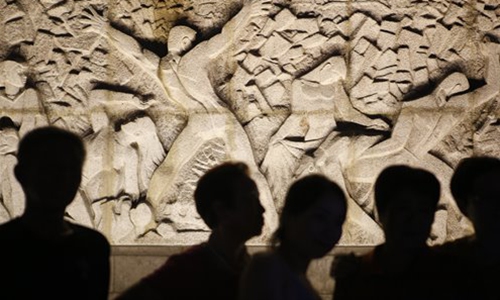HOME >> ARTS
Scholar proposes building epidemic-prevention museum as reminder to future generations
By Bi Mengying Source:Global Times Published: 2020/2/16 22:52:11

Visitors gaze upon a monument to the Tangshan earthquake in Tangshan, Hebei Province, July 27. Photo: Li Hao/GT
"An epidemic prevention museum will stand witness to history and act as a reminder for people to be vigilant; it will be full of memories, commemorations, people's condolence and a historical memorial," said a Chinese scholar pointing out the significance of building a museum dedicated to the history of Chinese people fighting epidemics such as SARS (Severe Acute Respiratory Syndrome) and the COVID-2019 epidemic.
There have been museums about public health, disease and medicine in other countries, such as the Museum of Human Disease in Sydney, Australia and the National Museum of Health and Medicine in Maryland, US. Take the UK's Eyam Museum in England for instance, which focuses on the bubonic plague that struck the village in 1665. On the TripAdvisor page for the museum, most typical reviews by visitors are "very informative and educational," which showcases the museum's importance when it comes to education.
However, despite such native outbreaks such as SARS and the current COVID-2019 epidemic, China doesn't have any national level museums of this kind, Chen Lüsheng, a well-known critic and former deputy curator of the National Museum of China in Beijing, noted in an article posted on his WeChat blog on Friday.
"After the SARS epidemic ended, we didn't attach enough importance to building a museum for public education," Chen told the Global Times on Sunday. Without such a medium for people to look back and reflect upon, "17 years probably isn't a long time. But to some extent, we forgot about this part of history and neglected relevant public health issues."
The museum will serve as an alarm, reminding society to pay continuous attention to public health and avoid repeating history with its exhibits. Making the proposal to build such a museum just as the country is mired in the fight against the novel coronavirus, Chen said he was hoping to urge relevant departments and organizations to start collecting items for the museum now.
"Once the epidemic ends, it will be hard to gather these items," he said.
"Some items may appear to possess no historic value to many people, but we need to look at things from a historical angle. When 50 or 100 years pass, they'll be relics. So they need to be collected now."
One case in point are the ancient Chinese poems written on boxes of supplies from Japanese donations to China to support the fight against COVID-2019, which touched many Chinese netizens' hearts and ended up going viral online. The now empty boxes could be collected for displays to remind people of the international support China received, noted Chen. Diaries by medics, masks and protective outfits, these types of items can all be included in the museum.
"Without a doubt, Wuhan seems to be the most suitable choice for the location of the museum. Many netizens left comments on my article suggesting that the Fang Cang makeshift hospitals be turned into museums. Some proposed that we use the Huanan seafood market [where the epidemic is suspected as having started], which could raise people's awareness about public health as well as the protection of wild animals," Chen said.
Chen further noted that for severe disasters such as the Tangshan Earthquake in North China's Hebei Province or the outbreak of SARS and the novel coronavirus, relevant departments and organizations should step up and make use of valuable historical and cultural resources for educational purposes such as building museums.
The Tangshan Earthquake Memorial was first built in 1985 to commemorate the victims of the Tangshan Earthquake. A 7.8-magnitude earthquake struck Tangshan on July 28, 1976 and claimed the lives of more than 240,000 people..
"In this way, the country can preserve history, reveal the stories of people fighting against these disasters and, more importantly, pay tribute to those who were lost," he concluded.
Posted in: CULTURE & LEISURE